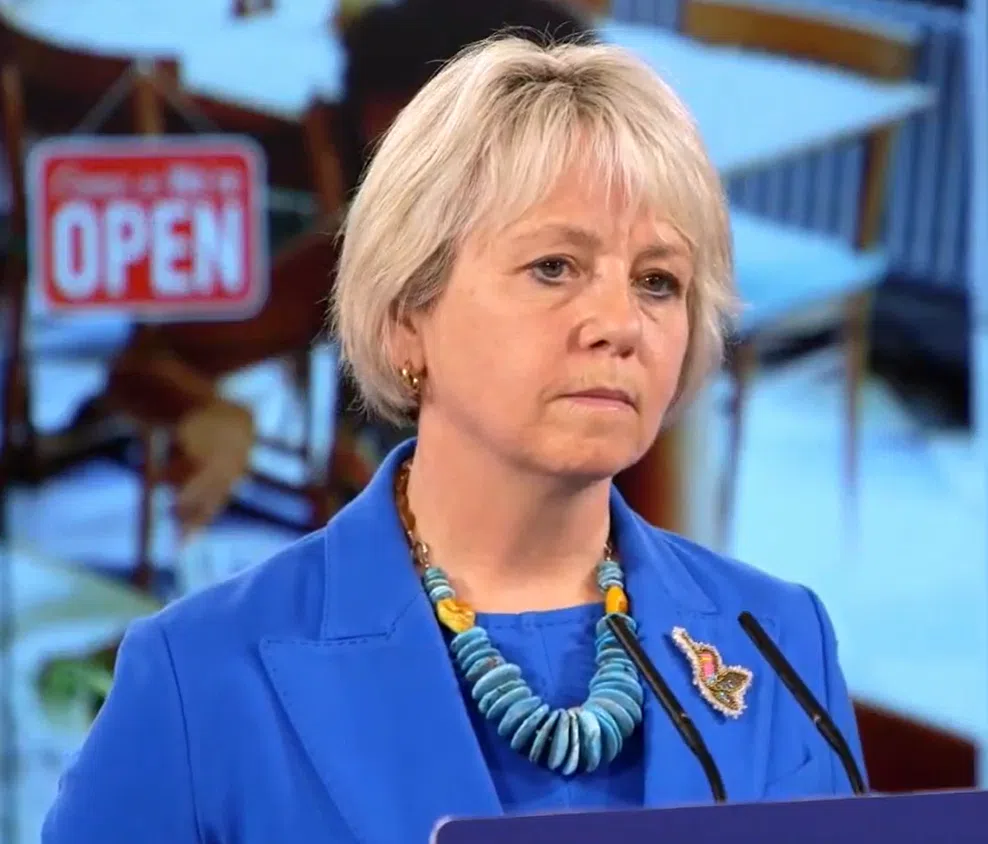
New COVID-19 cases continue to trend down in B.C., with 708 total new cases over the past three days.
That includes 258 cases being reported on Saturday, 238 on Sunday and 212 today. Of those, 113 cases were in Interior Health, while 394 were in Fraser Health, 140 were in Vancouver Coastal Health, 42 were in Northern Health, 18 were in Island Health and one was in a person who lives out of country.
There were also 11 COVID-19 deaths in the past three days in B.C. from the virus – one in a person in their 30s, two in their 60s, six in the 70s, and two over the age of 80.
There are now 2,953 active cases of COVID-19 in B.C., 488 fewer than Friday. Hospitalizations are at 249 (down by 43) while there are 78 people in intensive care unit (down by one).
Meanwhile, there have been 3.25 million vaccine doses administered across B.C., to more than 3.07 million people. Provincial Health Officer, Dr. Bonnie Henry says it means 69.7 per cent of people aged 18 and older in B.C. have received a first dose.
When it comes to people 12 and older, that number drops slightly to 66 per cent, but Henry is urging people to still be careful.
“We are in the midst of the post long weekend incubation period which means anyone who may have contracted the virus at that period of time will be starting to see symptoms now.,” she said. “It is important if you have any symptoms to get tested right away. You can get the support…so we can contain further spread.”
In all, about four per cent of British Columbians have been fully vaccinated, with second doses expected to ramp up in the coming weeks. Henry says it is important for people to register for a vaccine appointment to ensure they get both doses.
“Immunizations are an extremely effective tool and that is an important tool for us to get through this pandemic, but they are not fully protective yet, in our communities,” she added. “That’s why its important we all stay vigilant so that we can prevent transmission and stop this pandemic.”
“While we are making significant headway in our immunization efforts, and that is reflected in the decreasing case counts in our communities and in our hospitals, it is still a time of caution for all of us. New strains are circulating and outbreaks are still occurring in schools, in hospitals, in long term care, and in our communities.”
“No words can make right a deliberate system designed to assimilate and extinguish Indigenous people,” Dr. Henry says
Prior to her COVID-19 briefing today, Dr. Henry took a moment to acknowledge the discovery of the remains of 215 children at the site of the former Kamloops Indian Residential School.
“We must make no mistake that while these deaths happened in the past, our systems and laws continue to perpetuate racism and discrimination that hurts Indigenous peoples in countless ways,” she said. “I have stood at this podium many times as an expert in public health, and today I’m here as a humble learner in reconciliation and decolonization.”
Henry pledged her commitment to changing the systems and laws that continue to hurt Indigenous people across Canada.
“There are no words that can do justice to those children and the countless others who died alone and scared, far from home, far from the families who loved them,” she added. “There are no words that can make right a deliberate and intentional system that was designed to assimilate and extinguish Indigenous peoples.”
“Today I don’t offer words, but rather my renewed commitment to actions that arrest and disrupt our deeply rooted ideologies of settler supremacy.”
Henry says she will be discussing further steps with her team to implement more of the calls to action and rights outlined in UNDRIP and the Truth and Reconciliation Commission. She is also calling on Canadians to commit to taking those meaningful steps to uphold the rights of Indigenous people.
“This is hard work that requires us as leaders and settlers to find the courage to accept that this is our history of colonization. Its not something that happened to First Nations children and families, this is something we did to First Nations children and families,” she said.
“We are all implicated in this tragedy.”
Health Minister Adrian Dix also acknowledged the 215 unmarked graves found in Kamloops, and the “atrocity” and “multigenerational trauma” of residential schools in B.C., and in Canada. He too says we need actions and not words.














